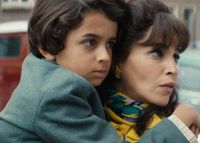In 2025, a heartfelt story that resonates with audiences is brought to life through the film adaptation of Roland Perez's autobiographical novel, Ma Mère, Dieu et Sylvie Vartan. Directed by Ken Scott, the film portrays the unwavering love of a mother navigating life’s complexities, particularly as she cares for her son born with a disability. It captures the essence of over 50 years, threading humor through deep emotional experiences, showcasing a narrative many find deeply relatable.
The film introduces viewers to Esther, played masterfully by Leïla Bekhti, who embodies the essence of a mother’s love. At every stage of her life, Esther's character shines through with an extravagant flair, embodying both humor and drama. Her son, portrayed by Jonathan Cohen, finds strength in her unconditional support, encapsulating a bond that challenges the norms of family life. As Beyhki mentions, "God could not be everywhere, so he created the mother," this quote encapsulates the film’s core theme of maternal love and sacrifice.
Released on March 19, 2025, the film quickly gathered momentum, becoming a subject of conversation as it surpassed 500,000 admissions within just the first week. This overwhelming response can be attributed to the way the film authenticates the traditions of a Jewish family while steering clear of clichéd portrayals. Viewers expressed their emotional investment during screenings, with many applauding at the end— a testimony to its emotional impact.
The narrative presents a family intertwined with both joy and challenges, highlighting the dynamics within a household dealing with a disability in a comic yet thoughtful manner. The unfolding story resonates with many, as it emphasizes resilience, love, and the pursuit of normalcy. The film revolves around Esther’s relentless quest to ensure her son not only walks but also leads a remarkable life, filled with adventure and kinship.
Ken Scott, known for his work in family-centric stories, adeptly adapts this autobiographical account from Roland Perez, infusing elements of comedy akin to American film styles. He creates an engaging spectacle that celebrates both family ties and cultural heritage while addressing deeper societal issues without getting too heavy-handed. The humor laces through scenes depicting mundane yet profound moments, transforming them into cinematic gold, a balance few films manage to achieve.
The characters, crafted with care, are portrayed in layers, revealing not just their flaws but also their resilience. Bekhti's Esther oscillates between being a loving, overbearing mother and an extravagant character, embodying traits that are both endearing and comical. Critics have already suggested that she is a strong contender for Best Actress at the César 2026, solidifying her place in cinematic history with her portrayal in this film.
However, amidst the humor and warmth, there are poignant moments that depict the struggle of accepting reality. The film doesn’t shy away from showing the family grappling with their circumstances, ensuring that these moments of vulnerability resonate deeply with the audience. The challenge is not solely physical but emotional, exploring the notion of what it means to be a mother and the extent of one’s love.
Supporting performances by talents such as Naïm Naji, Anne Le Ny, and Jeanne Balibar add richness to the narrative. Each character, no matter how minor, contributes to the overall tapestry that Ken Scott weaves, offering perspectives that enhance the commingled family dynamics. The film invites audiences into the quirky world of this Jewish family, where their traditions are celebrated with authenticity and depth.
The portrayal of cultural aspects diverges from stereotypes, offering viewers a fleeting glimpse into a world reflecting substance and sincerity—far from typical caricatures. This authenticity allows the audience to connect more genuinely with the characters, giving depth to an otherwise comedic narrative. The film has sparked conversations surrounding Jewish culture, shedding light on aspects often overlooked in mainstream cinema.
Despite some criticisms regarding the film's shift from childlike innocence to adult narcissism, it remains charmingly unique in its approach. Viewers recognize that while they follow a light-hearted plot, the foundations are built on complex themes of love, disability, and family responsibility, which can often lead to poignant reflections long after the credits roll.
In the grand scheme, Ma Mère, Dieu et Sylvie Vartan stands as more than just another film; it’s a heartfelt homage to mothers everywhere. The film transcends barriers, capturing that relentless spirit of motherhood, making it a must-watch experience for those seeking both laughs and a touching tale.






